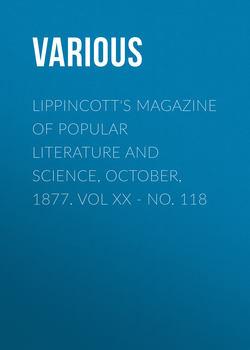Lippincott's Magazine of Popular Literature and Science, October, 1877. Vol XX - No. 118

Реклама. ООО «ЛитРес», ИНН: 7719571260.
Отрывок из книги
The history of Chester is that of a key. It was the last city that gave up Harold's unlucky cause and surrendered to William the Conqueror, and the last that fell in the no less unlucky cause of the Stuart king against the Parliamentarians. In much earlier times it was held by the famous Twentieth Legion, the Valens Victrix, as the key of the Roman dominion in the north-west of Britain, and at present it has peculiarities of position, as well as of architecture, which make it unique in England and a lodestone to Americans. Curiously planted on the border of the newest and most bustling manufacturing district in England, close to the coalfields of North Wales, the mines of Lancashire, the quays of its sea-rival Liverpool and the mills of grimy, wealthy Manchester, it still exercises, besides its artistic and historic supremacy, a bonâ fide ecclesiastical sway over most of these new places. It is the first ancient city accessible to American travellers, many of whom have given practical tokens of their affectionate remembrance of it by largely subscribing to the fund for the restoration of the cathedral, a work that has already cost some eighty thousand pounds.
The Dee is more a Welsh than an English river. It rises in the bleak mountain-region of Merionethshire, the most intensely Welsh of all counties, above Bala Lake, which is commonly but incorrectly called its source. Thence it flows through the Vale of Llangollen, famous in poetry, and waters the meadows of Wynnestay, the splendid home of one of Wales's most national representatives, Sir Watkin Williams Wynn, and only beyond that does it become English by flowing round and into Cheshire. On a very tiny scale the Dee follows something of the course of the Rhine: three streamlets combine to form it; these unite at the village of Llanwchllyn, and the river flows on, a mere mountain-torrent, past an old farmhouse, Caer-gai, lying on a desolate moor at the head of Bala Lake, and through the lake itself, after which its scenery alternates, like the Rhine's below Constance, between rocky gorges and flat moist meadows dotted with hamlets, churches and towns. Bala—otherwise Lin-Jegid and Pimblemere ("Lake of the Five Parishes")—has some traditional connection with the great British epic, or rather with its accessories—the Morte d'Arthur—of which Tennyson has availed himself in Enid, mentioning that Enid's gentle ministrations soothed the wounded Geraint
.....
"Fond of him!" Addie repeated. "He is very pleasant to talk to, if you mean that."
"Oh, you can't deceive me so! I believe that you are in love with him," said Lottie solemnly.
.....